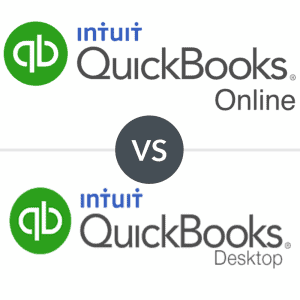Both offer great accounting features and integrations, but which one is better for small businesses? Our detailed comparison breaks down both options.
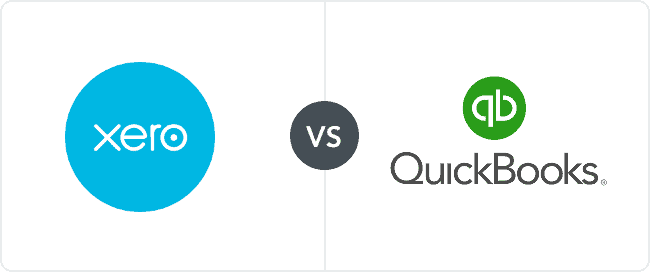
|
Xero |
QuickBooks Online |
| Ideal For |
- Mid- to large-sized businesses
- Businesses that need support for unlimited users
|
- Small- to mid-sized businesses
- Businesses with 1 to 25 users
|
| Pricing |
$15-$78/month |
$35-$235/month |
| Standout Features |
- 1,000+ integrations
- Excellent customer management system
- Supports unlimited users at no additional cost
|
- Advanced invoicing
- Built-in lending
- 80+ reports
|
| What’s Missing |
- Steep learning curve
- No phone support
- No tax support
|
- Must subscribe to higher-tier plans to get support for more users
- Some advanced features (such as inventory management) are only available on more expensive plans
- No email support
|
| Next Steps |
Visit Site
Read Review
|
Visit Site
Read Review
|
Xero VS QuickBooks At A Glance
Xero is cloud-based accounting software that supports cash-basis and accrual accounting. It also utilizes double-entry accounting. Xero has a robust set of features, an impressive number of integrations, and strong mobile apps for accounting on the go.
Xero supports unlimited users and grows with your business, making it a more suitable choice for mid-to-large-sized businesses. Some small businesses may also benefit from using Xero but may find that the learning curve of the software and the limitations of Xero’s lowest-cost plan may not be worth the time and expense.
QuickBooks Online shares some similarities with Xero. This cloud-based solution also supports cash-basis and accrual accounting methods and uses double-entry accounting. It has solid mobile apps, and it has a large number of integrations, although it falls a bit short of Xero.
QuickBooks Online also has advanced accounting features you won’t find with some of its competitors. However, unlike Xero, the software is quite intuitive and easy to use — even beginners with no prior accounting experience can master the software quite easily.
Where Xero Wins
While Xero and QuickBooks Online have a lot in common (i.e., advanced features and numerous integrations), there are a few features that separate the two. Xero comes out on top for its support of unlimited users at no additional cost — something that is pretty much unheard of in the accounting software world.
Xero also stands out for its strong security, which is pretty much unmatched in the industry. Something else that sets Xero apart is that it offers many of its features on all plans, unlike QuickBooks Online which requires upgrading to a higher tier plan for access to features like inventory management. Xero also has one of the strongest contact management features in the game.
Here’s a summary of where Xero stands out:
- Unlimited users on all pricing plans
- 99.97% uptime & one of the best reputations in the industry for its strong security
- Contact management feature with smart lists to target specific customers
- Inventory management on all pricing plans
- Accounts payable on all pricing plans
Where Xero Falls Short
While Xero’s entry-level plan seems like the better deal when compared to QuickBooks, limitations on invoices and bills make it suitable for very small businesses or freelancers. Xero also doesn’t have some built-in features that you’ll find with QuickBooks, including payroll (although Xero integrates with Gusto) or payment processing.
Many users love Xero for its advanced features. However, the software itself is difficult to learn if you don’t have prior accounting experience, so it isn’t the best choice for beginners.
In summary, here’s where Xero falls short when compared to QBO:
- Limitations on lowest-priced plan make it unsuitable for most businesses
- No built-in payroll (a Gusto integration is available)
- No built-in payment processing (several third-party options available)
- Steep learning curve makes it difficult to learn and use
Where QuickBooks Online Wins
QuickBooks Online is easy to use, so it’s a good choice for beginners. This software is best suited for small to mid-sized businesses, although its Advanced Plan that supports up to 25 users does make it a viable option for larger businesses.
QuickBooks Online takes the advantage when it comes to invoicing, offering six customizable invoice templates (compared to just one offered by Xero). It also offers mileage tracking, tax support, and (for a fee) bookkeeping services, which you won’t find with Xero.
QBO also has a handful of features you generally don’t see with accounting software, including its QuickBooks Capital lending platform and QuickBooks Checking business banking account.
Here’s a breakdown of where QuickBooks Online stands out:
- A user-friendly interface that’s easy for even beginners to learn
- Multiple invoice templates
- QuickBooks Capital, a built-in lending platform
- Mileage tracking
- Tax support
- Live bookkeeping services
Where QuickBooks Online Falls Short
While Xero supports unlimited users on all plans, QuickBooks Online only supports up to 25 — and this is only available on the most expensive plan.
Speaking of pricing, QuickBooks Online can get a little expensive and may be out of budget for smaller businesses looking for a more cost-effective accounting solution.
Here’s a summary of where QuickBooks Online falls short:
- Only supports up to 25 users (only available on the most expensive plan)
- Can be expensive, especially when add-ons are needed
Xero VS QuickBooks Online: Pricing Comparison
|
Xero |
QuickBooks Online |
| Price |
$15-$78/month |
$35-$235/month |
| Number Of Users |
Unlimited |
1-25 |
| Discounts Available |
|
|
| Payroll |
Gusto integration starts at $40/month + $6/month per employee |
$50-$130/month + $6-$11/month per employee |
| Payments |
Varies by third-party payment processor |
1%-3.5% |
| Live Bookkeeping |
Not available |
Starts at $50/month |
Xero offers three pricing plans that range from $15/month to $78/month. All plans support unlimited users.
Unfortunately, the lowest-priced Xero plan is quite limited, allowing users to enter only five bills and send 20 invoices per month. While this may be suitable for independent contractors or self-employed individuals, most users will need to upgrade to one of the more expensive plans.
Xero does not offer built-in payroll but partners with Gusto, which has plans starting at $40/month plus $6/month per employee. There is no built-in payment processing, although you can choose from several options including Stripe and GoCardless. Live bookkeeping services are not available.
A 30-day free trial is available to test out the software. Discounts are available for nonprofits and users that own multiple businesses.
QuickBooks Online has four pricing plans ranging from $35/month to $235/month. The more expensive QuickBooks plans include additional features and users.
Add-ons include QuickBooks Payroll, which starts at $50/month plus $6/month per employee. QuickBooks Payments allow you to accept ACH, credit card, debit card, and other payments at rates of 1% to 3.5% per transaction. Live bookkeeping services for additional help with your books start at $50/month.
QBO frequently runs discounts for new users. A 30-day trial is available. However, if you take advantage of this trial, you will not be able to receive a new user discount, so choose wisely.
Xero VS QuickBooks Online: Features Comparison
| Feature |
Xero |
QuickBooks Online |
| Invoicing |
|
|
| Inventory Management |
|
Plus & Advanced Plans |
| Contact Management |
|
|
| Expense Tracking |
|
|
| Mileage Tracking |
|
|
| Project Management |
Established Plan |
Plus & Advanced Plans |
| Time Tracking |
Established Plan |
Essentials, Plus, & Advanced Plans |
| Accounts Payable |
|
|
| Reports |
55+ |
80+ |
| Tax Support |
|
|
| Lending |
|
|
| Live Bookkeeping |
|
|
| Payroll |
Gusto integration |
|
Neither Xero nor QuickBooks Online is lacking when it comes to features. Both have basic accounting features, including invoices, estimates, bank reconciliation, expense tracking, and journal entries. With both programs, advanced features like time tracking and inventory management are available on select plans. Both also have robust reporting capabilities.
There are a handful of differences between the features of QuickBooks Online and Xero. Xero has a more impressive contact management feature with smart lists for targeting specific customers. However, QuickBooks Online offers features you won’t find with Xero, such as mileage tracking and built-in lending, and also has stronger invoicing.
Here’s a full breakdown of the main features of Xero and QuickBooks Online.
Invoicing
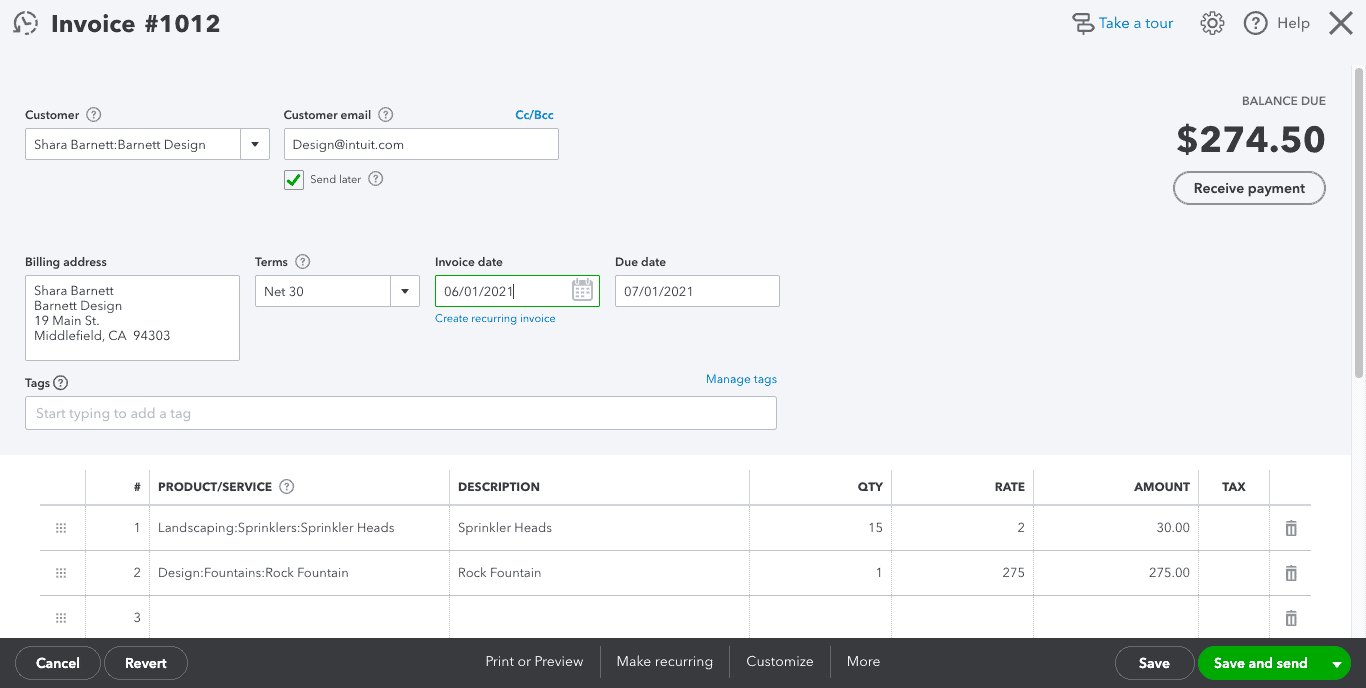
Both Xero and QuickBooks Online include invoicing, but there are a few reasons why QBO has the edge. With QuickBooks Online, all plans come with unlimited invoicing. Xero’s Growing and Established plans have unlimited invoicing, while the Early plan caps users at 20 invoices per month.
QuickBooks Online offers much better invoicing with multiple templates to choose from as well as built-in packing slips. Xero only has one invoice template, and you have to download and import a packing slip template into the software.
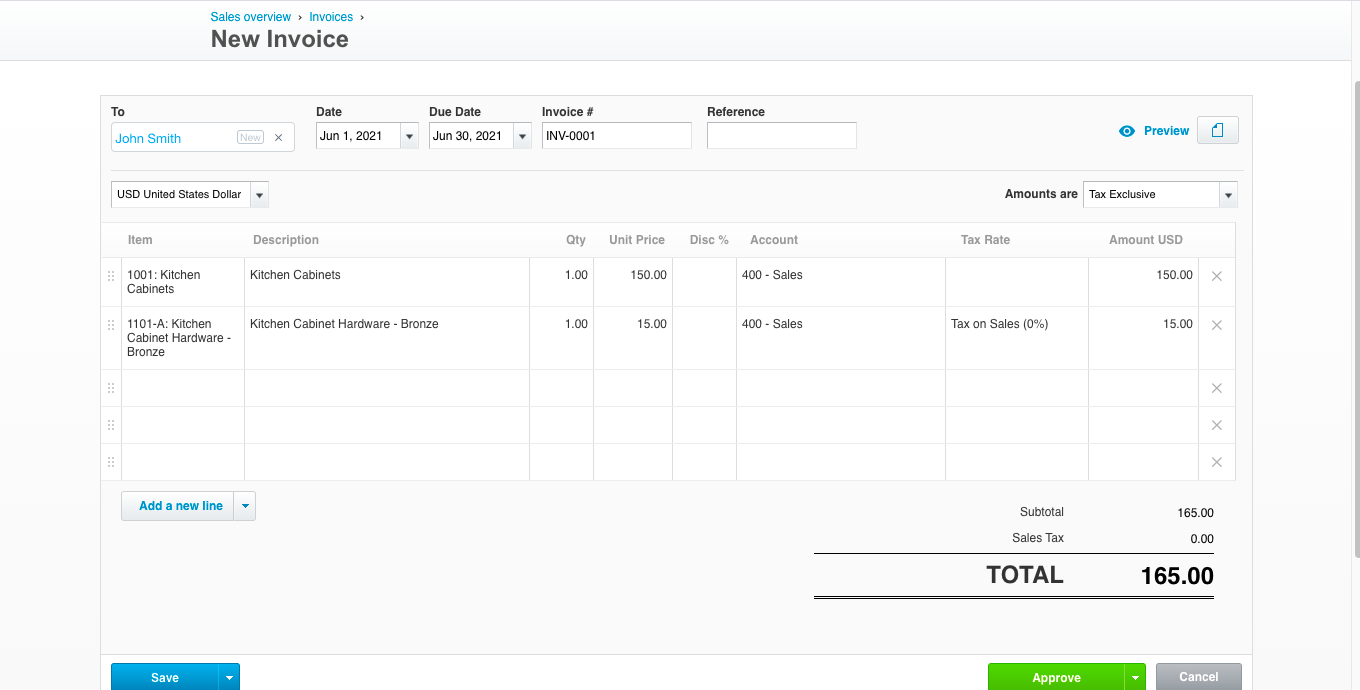
Inventory
Xero has an inventory management system available on all plans. With this system, you can add products or services, track inventory, make adjustments, make internal notes, and add attachments.
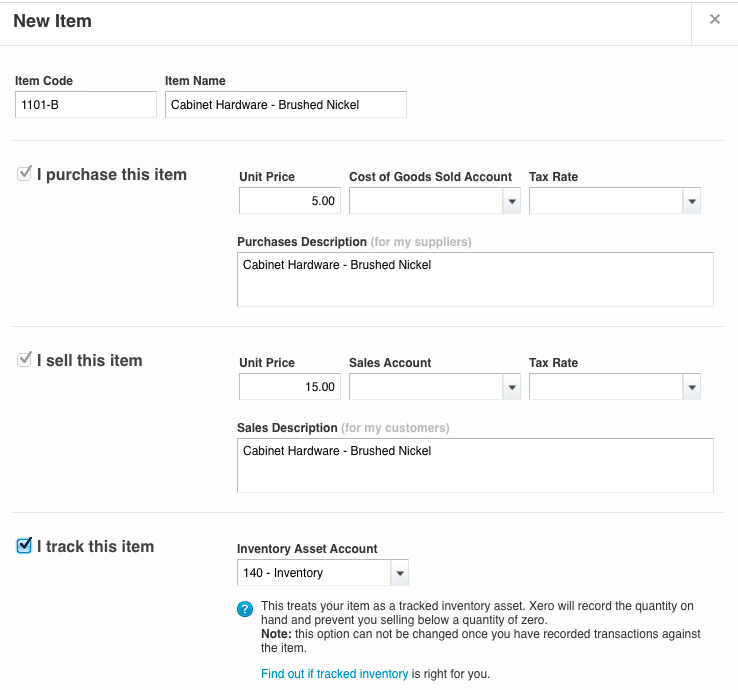
QuickBooks Online has a more advanced inventory management system, but it is only available on its two highest-priced plans. You can, however, add products and services with any plan, but only Plus and Advanced subscribers can track inventory, create item bundles, set reorder points, and perform more advanced inventory functions.
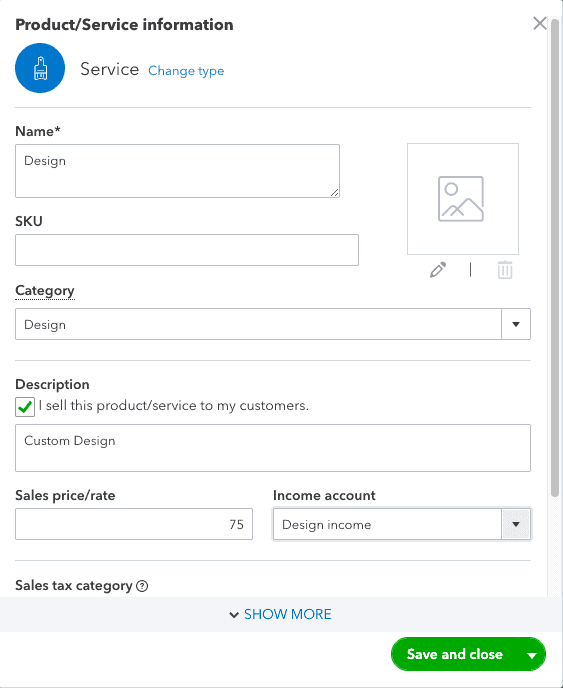
Mileage Tracking
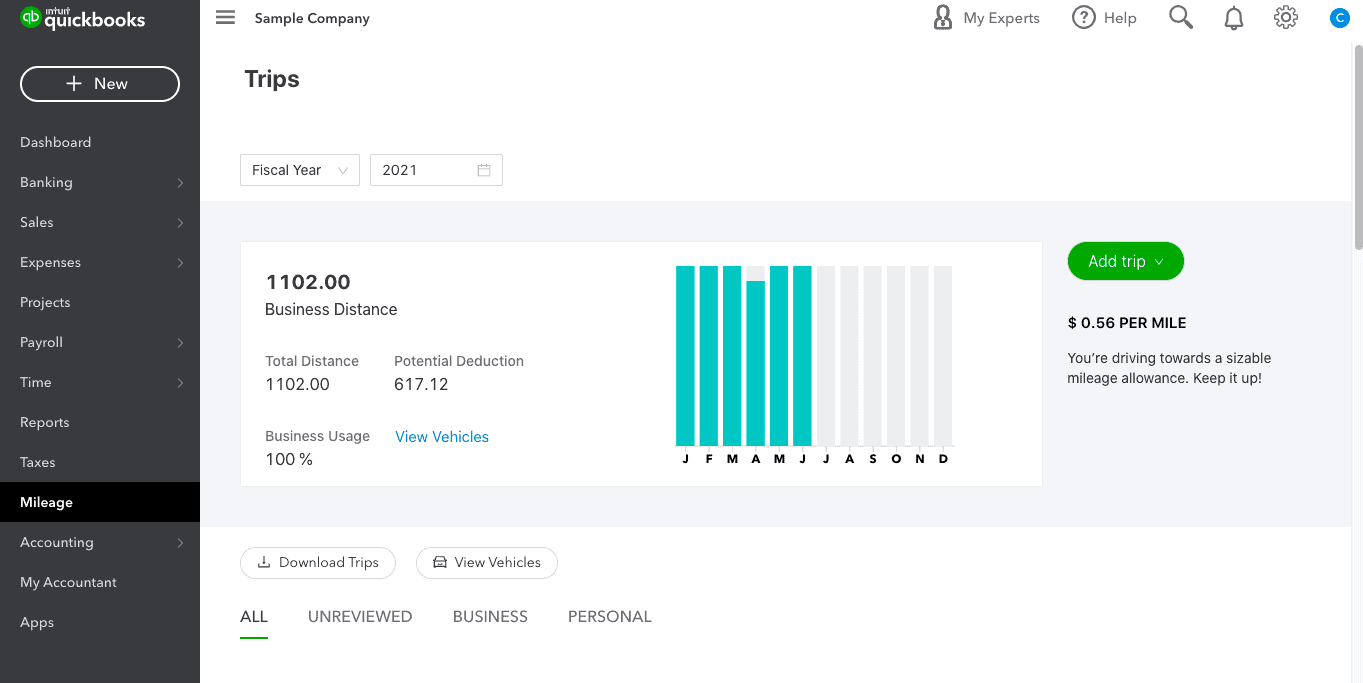
One of the more recent additions of QuickBooks Online is a mileage tracking feature. This feature is available on all plans. Xero does not have mileage tracking.
Tax Support
QuickBooks Online offers great tax support. Through QBO, you can prepare and print W-2s for your employees and 1099-MISCs for your contractors. QuickBooks Live Tax also gives you access to expert tax advice, maximum tax deductions, and tax filing through TurboTax (pay only when you file).
Since Xero no longer has built-in payroll, its tax support is limited only to sales tax.
Lending
QuickBooks Capital gives you a way to get a hassle-free small business loan. You can apply right within the software, and your financial information is used to determine if you qualify and the amount you can receive.
There is not a built-in lending feature available on Xero.
Live Bookkeeping
If you don’t want to handle your books yourself, you can sign up for QuickBooks Live Bookkeeping. This add-on is available for an additional charge and assigns a professional bookkeeper to manage your books.
Xero does not offer a similar feature
Integrations
When it comes to integrations, QuickBooks Online and Xero are neck-and-neck, with each boasting more integrations than most accounting software options.
QuickBooks Online has over 750 integrations encompassing everything from customer management and payment processing to tax preparation and lending. API is also available for developers.
Xero has over 1,000 integrations, so you can connect with other software and apps to manage inventory, process payments, track time, and more. API is also available for developers.
Payroll
QuickBooks Online has built-in payroll that is available for an extra monthly fee. QuickBooks Online Payroll has three plans available: Payroll Core, Payroll Premium, and Payroll Elite. The more expensive the plan, the more features you get, including same-day direct deposit, HR support, expert setup, and mobile time tracking.
Xero does not have its own in-house payroll software, but it does integrate with Gusto.
Customer Service
Both Xero and QuickBooks Online have troubles when it comes to customer service. The biggest downside of Xero’s customer service is that there is no phone support available. Email support is available, but it may take up to one day to receive a response to your inquiry. There are other ways to get the help you need fast, including the Xero Central help center, Xero TV videos, and in-software help.
QuickBooks Online does offer phone support for its customers but doesn’t have email support. Phone wait times are often short, but the helpfulness and knowledge of representatives vary, so resolving your issue may take some time. QuickBooks Online has a number of other support resources, including a help center, in-software help, training, and guides, to help you get the answers you need.
Which Is Best For My Business: Xero Or QuickBooks Online?
Both QuickBooks Online and Xero are good accounting solutions, but the right software is going to depend on your company’s budget and feature needs.
QuickBooks Online is full-featured accounting software that is easy to use, even if you’re new to accounting. In addition to the standard accounting features you’d expect, QuickBooks Online also has advanced features, exceptional invoicing automatizations and customizations, and built-in lending. It also has mobile apps that, according to users, outperform other popular accounting software apps.
QuickBooks Online has always been a great option for small businesses. With the addition of the Advanced plan, QBO is a good choice for larger businesses, as well.
On the other hand, Xero may be the better choice for your business. Xero is strong accounting software that has everything you need to track the financials of your business. Some of its features really stand out, such as its customer management system.
However, there is a steep learning curve with this software. If you don’t have the time to devote to learning the software, QuickBooks Online may be the better fit.
Choose Xero If…
- You own a mid-to-large-sized business
- You have multiple users
- You need scalable software that grows with your business
Choose QuickBooks Online If…
- You own a small- to mid-sized business
- You want strong accounting software that’s easy to use
- You need solid mobile apps for on-the-go accounting
- You want an all-in-one solution for payroll, tax filing, payroll, and payment processing
Make sure to check out our full reviews of Xero and QuickBooks Online for more details and to help you decide.
And if you find that neither company meets your needs, you may be better off with one of our top accounting software picks for small businesses.
Regardless of what route you choose, make sure to do your research and get hands-on with free trials to find the accounting software that’s right for your business.
 Chelsea Krause is a writer who specializes in accounting, payroll, and small business loans. She has been helping small business owners manage their finances since 2016. She is a QuickBooks Certified User and former eCommerce store owner. Her accounting expertise has been quoted in Forbes and her work appears in Startup Nation, Small Business Bonfire, and Women on Business. Chelsea graduated summa cum laude with a BA in English & Creative Writing from George Fox University and studied abroad at the University of Oxford as well.
Chelsea Krause is a writer who specializes in accounting, payroll, and small business loans. She has been helping small business owners manage their finances since 2016. She is a QuickBooks Certified User and former eCommerce store owner. Her accounting expertise has been quoted in Forbes and her work appears in Startup Nation, Small Business Bonfire, and Women on Business. Chelsea graduated summa cum laude with a BA in English & Creative Writing from George Fox University and studied abroad at the University of Oxford as well.QuickBooks Online has a much more intuitive interface and is easier to learn, but once you get passed the learning curve, Xero has more advanced features and unlimited users — not to mention that Xero is much cheaper than QBO.














